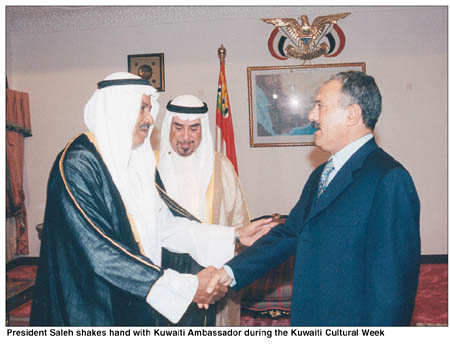Harassment of Press Needs Direct Interference of the President [Archives:2000/16/Law & Diplomacy]
Mohammed Sadiq Al-Udaini
Journalist who spent a 2-year term in prison
“Say whatever you want. Stability is based on freedom and I will never file a case against a journalist.” Emil Lahood, Lebanese President.
After a series of postponements, the West Secretariat Court pronounced its unprecedented verdict on Al-Wahdawi Newspaper and its journalist Mr. Gamal Aamer in February. Al-Wahdawi was suspended for a month while Gamal Aamer was, besides being fined YRs 5,000, forbidden from writing for good.
Suspension of newspapers, as well as journalists has become a common phenomenon in a country that seems to abandon all ideals of the 22nd of May.
Since the War of 1994, many journalists and writers had been sentenced to prison terms and newspapers sued. Such practices are no longer surprising for many people. It is right that they arouse local, and international condemnation, but this would always end up with some letters or statements expressing dissatisfaction. May be because it is a natural phenomenon in countries of emerging democracies.
However, what has distinguished this verdict and made it a target of condemnation is the forbidding Mr. Gamal Aamer to writing. Such a verdict has not been heard of in countries of emerging democracies. People may ask why the judge did not sentence him to imprisonment. Is there any thing worse? The judge felt that if he gave his final verdict to imprison Aamer he would be doing nothing meaningful, given that under the present situation the country looks as a large prison and thus it would make no difference for Mr. Aamer to be locked up in a prison, forming a part of a larger one.
In this verdict, the judge satisfied enemies of freedom of expression. However, he tarnished the image of the leadership. I do not find fault with the judge for his verdict because he might find be rewarded for his verdict amid the disorder and chaos prevailing in the country.
In my opinion, the verdict did not target journalism and its constitutional rights but it rather aimed at the ruling party, because such verdicts put the state in a dilemma. This is what has really happened to the state in the eyes of the world in the contest of the Yemeni government’s commitment to the international organizations and donors to respect and protect human rights and freedoms.
Observers of what is happening in the political life in Yemen during the past few years would notice an abnormal situation being strengthened through a series of activities and policies, the least of which is that it has trampled on its commitment to the democratic principles. This situation requires a direct interference by the president to salvage the situation.
President Ali Abdullah Saleh always emphasizes his support for the freedom of press. He always calls upon journalists to take advantage of pluralism to address what is wrong. In his electoral manifesto, he committed himself to supporting, as well as protecting freedom of the press and expression and working for the independence of the judiciary. This is what the entire country really hopes for.
At the end, Mr. President, let me repeat what I have once said while in prison that your people are pinning all hopes upon you. Undoubtedly, you realize that the new era must witness brave legislation and measures to enhance freedoms and democracy, otherwise the ” promise” would be meaningless one and there would be no one in future to hail you.
——
[archive-e:16-v:2000-y:2000-d:2000-04-17-p:./2000/iss16/l&d.htm]


